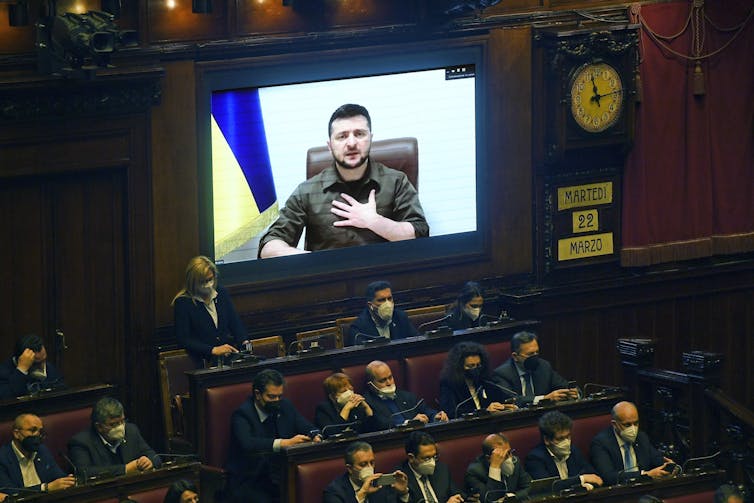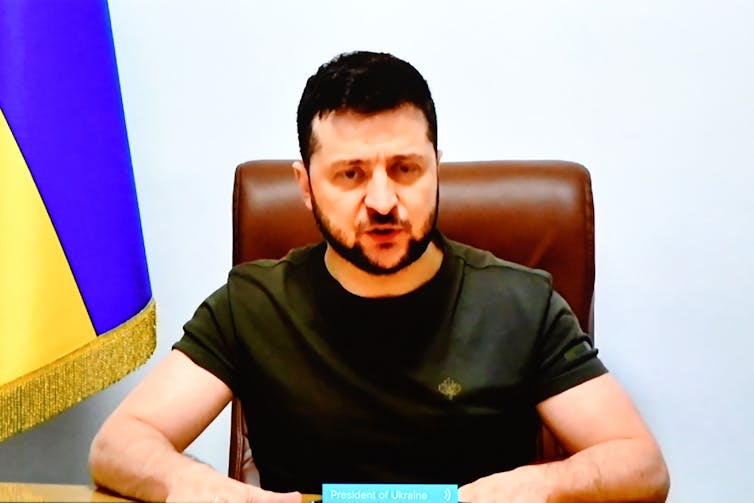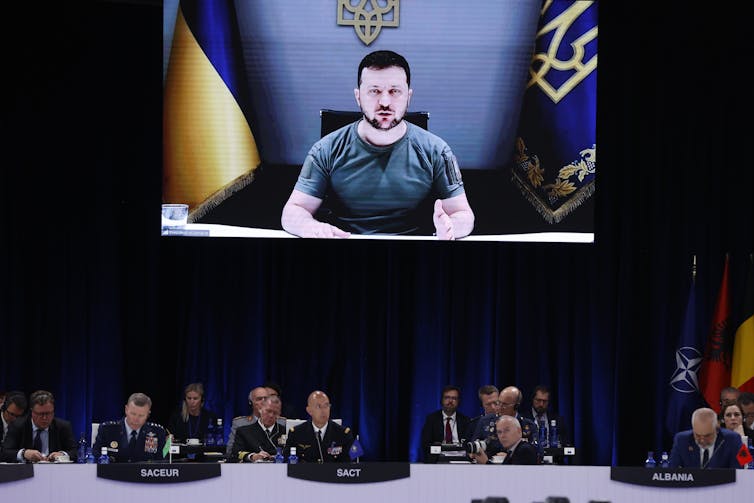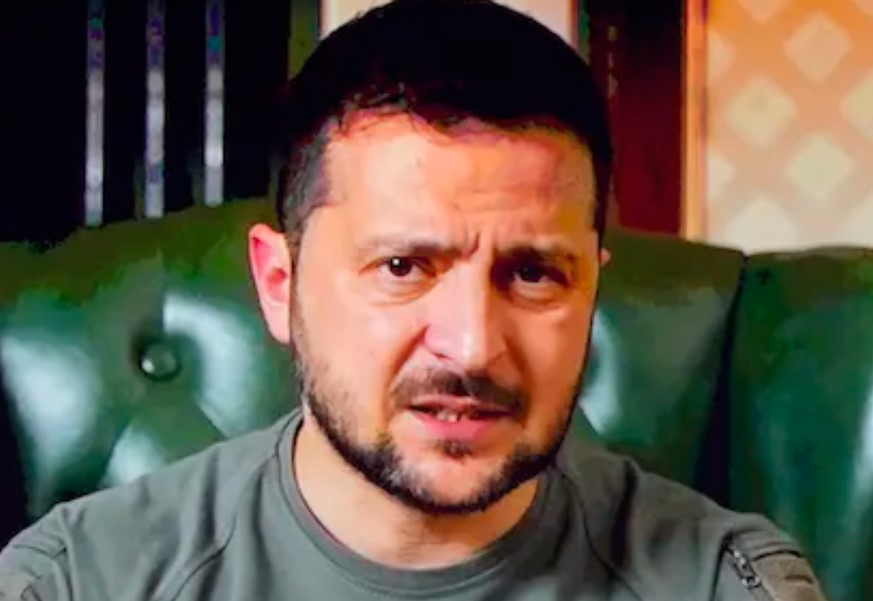PRESIDENT ZELENSKY'S SPEECHES
December 4th 2022
Article by Jessica Genauer, published November 1, 2022, by The Conversation.
Since Russia invaded Ukraine on February 24, Ukrainian President Volodymyr Zelensky has captured the world’s attention with powerful speeches broadcast from a besieged Kyiv. His words have galvanised global support for Ukraine’s struggle.
Now, a selection of 16 wartime speeches, chosen by Zelensky himself, will be published in a new volume: A Message From Ukraine. All proceeds from book sales will go to United24, an initiative established by him to raise funds for Ukraine.
The sheer volume of speeches delivered since February by Zelensky – a former TV comedian and actor with a degree in law – is almost overwhelming, with multiple speeches given daily. Thanks to modern technology, he has never lost direct, real-time access to decision-makers and ordinary people.
He has virtually addressed national parliaments across Europe and North America, as well as Israel, South Korea, Japan and Australia, along with international summits and meetings including the European Council and the United Nations Security Council. Last month he even addressed the Frankfurt Book Fair.
Zelensky also provides a nightly video address on each day’s events, uploaded to social media channels and the government’s official site. His speeches have won hearts and minds across the world. What drives the power behind his words?
Zelensky speaks directly to camera with a focused presence and open intensity, sometimes showing a small smile, placing one hand on his heart or raising a fist in the air. The viewer feels warm emotion behind his words.
Since the invasion, he has delivered his speeches in casual military-style clothes – a T-shirt, cargo pants, and old sneakers, emphasising that he is an ordinary man speaking for his country in extraordinary times.
These factors make his addresses accessible and powerfully human, in stark contrast to the seemingly inhuman brutality of war.

His speeches to national parliaments, meanwhile, compellingly draw on touch points of significance to that country itself, evoking imagery that resonates effortlessly with the general populace.
For example, speaking to the US’ Congress, Zelensky evoked the September 11 terror attacks in New York and the attack on Pearl Harbour in 1941.
Speaking to the United Kingdom’s parliament, Zelensky seemed to channel the spirit of British wartime Prime Minister Winston Churchill, echoing fragments of the latter’s words in dramatic prose. Speaking to the Finnish parliament, Zelensky alluded to the scars of the Soviet invasion of Finland in 1939.
Addressing the Australian Parliament on March 31, Zelensky evoked themes that would resonate locally. He spoke of the pain of the MH17 air tragedy, the importance of maritime freedom of navigation, and the unbreakable nature of dreams. Referring to the downing of a Ukrainian plane, he said:
Can we say that Russia has destroyed our dream? No. It destroyed matter, not soul. The shell, not the essence … We know that our dream cannot be defeated and destroyed.

Zelensky is also not afraid to evoke the uncomfortable ghosts of a nation’s history, in appealing to countries. Speaking to the German parliament, he alluded to the Cold War era Berlin Wall, describing a new symbolic wall created by Germany’s prioritising its economy over standing up to Russia:
This is the Wall … that we [Ukrainians] are hammering on while fighting to save our people.
Beyond these nation-specific narratives, Zelensky’s nightly speeches often draw on universal themes, emphasising the relevance of Ukraine’s war to people all over the world.
They reiterate that Ukraine is engaged in a broader human struggle for freedom over tyranny, for life over death. The aspiration to move from oppression to freedom, to choose life in the face of destruction, is one in which almost all countries and populations have a part to play.

Kyiv, Zelensky said on April 6, “is the capital of global democracy, the capital of the struggle for freedom for all on the European continent”.
As he stated in August,
Our people united the free world not just around their struggle for freedom, but around understanding how fragile our freedom is. The freedom of every nation in Europe and in other parts of the world.“
Zelensky’s words reinforce the image of this war as a struggle between life and death, between normality and madness, between creation and destruction. "Before Russia came, there was normal life everywhere on Ukrainian land,” he said in September.
Speaking more recently, on October 23, he said,
Wherever Russia has brought death and degradation, we are restoring normal life. This is precisely about Ukrainians. Where Ukraine is, life is never destroyed … Ukraine is always about recovery. Always about life … This is what distinguishes Ukraine from Russia. This is what will help us win in the end. Because we fight and work for life.
This yearning for life is reinforced by Zelensky’s allusions to an unbreakable spirit that outlives any attempted destruction. “No Russian missiles, no strikes can break the morale of Ukrainians,” he has said.
Always remember: Ukraine existed before this enemy appeared, and Ukraine will exist after it.“
Despite these continuities, some things have changed in Zelensky’s speeches over time. As war crimes committed by Russians on Ukrainian soil have been revealed, Zelensky’s description of Russian soldiers has shifted.
In the early weeks after the invasion, Zelensky referred in his nightly address to Russian soldiers as "confused children who were used”.
A month later, on April 3, he changed his stance, declaring that
Concentrated evil has come to our land … Russian mothers! Even if you raised looters, how did they also become butchers? You couldn’t be unaware of what’s inside your children. You couldn’t overlook that they are deprived of everything human. No soul. No heart.
Russia’s full-scale invasion of Ukraine has already incurred incalculable human costs – and the war is far from over.
However, one thing is clear: Zelensky’s capacity to make meaning out of a seemingly meaningless situation, to evoke national stories, to weave a narrative that is bigger than any one life or any one nation, has shaped the way in which people around the world have experienced and understood this war.
Perhaps, the true power of Zelensky’s speeches lies ultimately in the very ordinariness of his manner and message – reminding us that we all strive for freedom and life, and showing us the power of remaining human even under the most inhuman conditions.
Since Russia invaded Ukraine on February 24, Ukrainian President Volodymyr Zelensky has captured the world’s attention with powerful speeches broadcast from a besieged Kyiv. His words have galvanised global support for Ukraine’s struggle.
Now, a selection of 16 wartime speeches, chosen by Zelensky himself, will be published in a new volume: A Message From Ukraine. All proceeds from book sales will go to United24, an initiative established by him to raise funds for Ukraine.
The sheer volume of speeches delivered since February by Zelensky – a former TV comedian and actor with a degree in law – is almost overwhelming, with multiple speeches given daily. Thanks to modern technology, he has never lost direct, real-time access to decision-makers and ordinary people.
He has virtually addressed national parliaments across Europe and North America, as well as Israel, South Korea, Japan and Australia, along with international summits and meetings including the European Council and the United Nations Security Council. Last month he even addressed the Frankfurt Book Fair.
Zelensky also provides a nightly video address on each day’s events, uploaded to social media channels and the government’s official site. His speeches have won hearts and minds across the world. What drives the power behind his words?
And ordinary man in extraordinary times
Zelensky speaks directly to camera with a focused presence and open intensity, sometimes showing a small smile, placing one hand on his heart or raising a fist in the air. The viewer feels warm emotion behind his words.
Since the invasion, he has delivered his speeches in casual military-style clothes – a T-shirt, cargo pants, and old sneakers, emphasising that he is an ordinary man speaking for his country in extraordinary times.
These factors make his addresses accessible and powerfully human, in stark contrast to the seemingly inhuman brutality of war.

Nation specific imagery
His speeches to national parliaments, meanwhile, compellingly draw on touch points of significance to that country itself, evoking imagery that resonates effortlessly with the general populace.
For example, speaking to the US’ Congress, Zelensky evoked the September 11 terror attacks in New York and the attack on Pearl Harbour in 1941.
Speaking to the United Kingdom’s parliament, Zelensky seemed to channel the spirit of British wartime Prime Minister Winston Churchill, echoing fragments of the latter’s words in dramatic prose. Speaking to the Finnish parliament, Zelensky alluded to the scars of the Soviet invasion of Finland in 1939.
Addressing the Australian Parliament on March 31, Zelensky evoked themes that would resonate locally. He spoke of the pain of the MH17 air tragedy, the importance of maritime freedom of navigation, and the unbreakable nature of dreams. Referring to the downing of a Ukrainian plane, he said:
Can we say that Russia has destroyed our dream? No. It destroyed matter, not soul. The shell, not the essence … We know that our dream cannot be defeated and destroyed.

Zelensky is also not afraid to evoke the uncomfortable ghosts of a nation’s history, in appealing to countries. Speaking to the German parliament, he alluded to the Cold War era Berlin Wall, describing a new symbolic wall created by Germany’s prioritising its economy over standing up to Russia:
This is the Wall … that we [Ukrainians] are hammering on while fighting to save our people.
‘We fight and work for life’
Beyond these nation-specific narratives, Zelensky’s nightly speeches often draw on universal themes, emphasising the relevance of Ukraine’s war to people all over the world.
They reiterate that Ukraine is engaged in a broader human struggle for freedom over tyranny, for life over death. The aspiration to move from oppression to freedom, to choose life in the face of destruction, is one in which almost all countries and populations have a part to play.

Kyiv, Zelensky said on April 6, “is the capital of global democracy, the capital of the struggle for freedom for all on the European continent”.
As he stated in August,
Our people united the free world not just around their struggle for freedom, but around understanding how fragile our freedom is. The freedom of every nation in Europe and in other parts of the world.“
Zelensky’s words reinforce the image of this war as a struggle between life and death, between normality and madness, between creation and destruction. "Before Russia came, there was normal life everywhere on Ukrainian land,” he said in September.
Speaking more recently, on October 23, he said,
Wherever Russia has brought death and degradation, we are restoring normal life. This is precisely about Ukrainians. Where Ukraine is, life is never destroyed … Ukraine is always about recovery. Always about life … This is what distinguishes Ukraine from Russia. This is what will help us win in the end. Because we fight and work for life.
This yearning for life is reinforced by Zelensky’s allusions to an unbreakable spirit that outlives any attempted destruction. “No Russian missiles, no strikes can break the morale of Ukrainians,” he has said.
Always remember: Ukraine existed before this enemy appeared, and Ukraine will exist after it.“
From ‘children’ to ‘butchers’
Despite these continuities, some things have changed in Zelensky’s speeches over time. As war crimes committed by Russians on Ukrainian soil have been revealed, Zelensky’s description of Russian soldiers has shifted.
In the early weeks after the invasion, Zelensky referred in his nightly address to Russian soldiers as "confused children who were used”.
A month later, on April 3, he changed his stance, declaring that
Concentrated evil has come to our land … Russian mothers! Even if you raised looters, how did they also become butchers? You couldn’t be unaware of what’s inside your children. You couldn’t overlook that they are deprived of everything human. No soul. No heart.
Russia’s full-scale invasion of Ukraine has already incurred incalculable human costs – and the war is far from over.
However, one thing is clear: Zelensky’s capacity to make meaning out of a seemingly meaningless situation, to evoke national stories, to weave a narrative that is bigger than any one life or any one nation, has shaped the way in which people around the world have experienced and understood this war.
Perhaps, the true power of Zelensky’s speeches lies ultimately in the very ordinariness of his manner and message – reminding us that we all strive for freedom and life, and showing us the power of remaining human even under the most inhuman conditions.

Click to close

